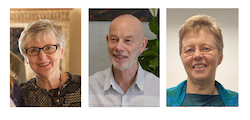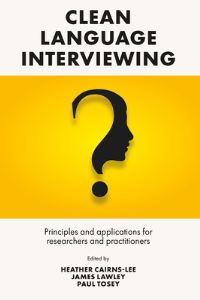Grovian Metaphor Therapy conducted in a lecture demonstration in 1998
Comments and transcription by Rob McGavock
The following is a demonstration conducted by David Grove with a volunteer Paul, in front of an audience. In this unravelling of information and lecture to the audience, David demonstrates the powerful healing capabilities of the redemptive metaphor. (The article by David Grove: Problem Domains and Non-Traumatic Resolution through Metaphor Therapy explains “The Quadrants” and David’s other terminology).
David begins with a single question asking Paul what he wishes to accomplish. David then notices a hand movement that he includes in the beginning of the process. As you read through this intervention, notice how information occupies space around Paul.
David’s notion that much of our historical information is carried outside of our body in problem domains rather than inside is highly useful. Questions that pull-back through a person’s history are articulated and sometimes adjusted by David. Being pulled backwards in time is a very unfamiliar direction for the participant. By sticking with the process David helps Paul to be rewarded with a powerful redemptive metaphor that is equal and opposite in strength to the troubling sensation of fear he begins with. Read and observe as David leads Paul in this healing process. (Quotation marks are used to denote David’s care in emphasizing Paul’s own words.)
David: What would you like to accomplish?
Paul: (Sitting on a chair stool, hands turned out) My fear.
David: “Your fear”?
Paul: My fear.
David to audience:
Could you see those hands turning out? There’s quite a bit of information out in that space with those hands. So, let’s see what information we can get with those hands.
David to Paul: So, what kind of hands are those hands?
Paul: Hands that are behind me.
David: So, they are “hands that are behind you”. And, when they are “hands that are behind you”, anything else about “hands that are behind you”?
Paul: Fear.
David: And, how far are these “hands” when “they’re behind you… and there is fear”?
Paul: Any place where I know that they are behind me.
David: So, what kind of “place” is the “any place” that “you know is behind you”?
Paul: Right here in this room a few minutes ago.
David: So, what kind of “fear” is that “fear”?
Paul: An old fear.
David: And, how far behind you is an “old fear”, and is it directly “behind you” or off to an angle?
(RM: This type of question clarifies where in space information resides.)
Paul: It’s very close to me, but it’s far behind me in time.
David: But, it’s “very close to you” in space? So, how “close” is it to you?
Paul: (Quickly) It’s smothering.
David: So, does it touch you?
Paul: Yes.
David: Where does it touch you when “it is smothering”?
Paul: All over my back.
David: So, it’s “all over your back”. Is there any other part of your body that it touches when it’s “all over your back?”
Paul: My body, my whole body.
David: When it touches “your whole body and it’s smothering”, is it “smothering” soft or hard?
Paul: It’s soft.
David: It’s a “soft smothering”. Anything else about it when it’s a “soft smothering?”
Paul: I feel it in my groin.
David: And, when it’s a “soft smothering” and “you feel it in your groin” and it’s right “behind you”, where did it come from just before it’s “smothering you”?
(RM: this question, inconjunction with the next question, achieves the first Pulling Back)
Paul: I don’t know.
David: And, when “you don’t know” where it came from just before it’s “smothering”, what happened just before it’s “smothering”?
Paul: I felt safe.
David: And, when “you felt safe”, what kind of “safe” was it that “you felt” just before “smothering”?
Paul: (Hands come up in front and open wide) Safe comfort.
David: And, anything else about that “safe comfort”?
Paul: That’s me.
David: And, what kind of “me” is a “me” that’s “safe”?
Paul: A me that’s me.
David: How old could a “me that’s me” be that’s “safe”?
Paul: A-year-and-a-half.
David: And, what could “a-year-and-a-half” be wearing when “a-year-and-a-half” is “safe”?
Paul: Little shorts and a tee shirt.
David: Anything else about “a-year-and-a-half” that is “safe” and “little shorts and a tee shirt”?
Paul: And a wild onion smell.
David: And, when “a-year-and-a-half” is “safe”, and “little shorts and a tee shirt”, “and a wild onion smell”, and how old could “smothered” be when something is “behind”?
Paul: Two.
David: And, “two”. And, when “a year-and-a-half” is “safe” anything else about “a-year-and-a-half” when “a year-and-a-half” is “safe”?
Paul: Joy.
David: And, what kind of “joy”?
Paul: In life.
David: And, there is “joy in life”, anything else about “joy in life of a-year-and-a-half”?
Paul: And, there’s sunshine.
David: And, what kind of “sunshine”?
David to audience:
Understand that this is in the ground (environment) now? I’m at T-2 now. We started off with pure affect (fear) at first, then as I pulled back we got “a-year-and-a-half”. So, I’m going to see if we can find some things we can use with whatever this is back here (points to the “behind him smothering”). And, so we’re going out to the ground, which now takes it (the smothering) away from him, and into the ground around him.
David to Paul: So, what kind of “sunshine” is a “sunshine that is a-year-and-a-half”?
Paul: It’s bright and warm.
David: Anything else about that “bright and warm sunshine”?
Paul: It’s comforting.
David: And, it’s a “comforting bright and warm sunshine”. And, where does the “comforting” of that “bright warm sunshine” come from?
Paul: (Looking down in front) The earth, and the sky, and the sun.
David: And, anything else about “the earth, the sky, and the sun” that makes “bright warm sunshine”?
Paul: Smells good.
David: And, it “smells good”. Anything else about that “smell”?
Paul: I like it.
David: And, “you like that smell”. And, what kind of “smell” is a “smell that you like”?
Paul: The smell of wild onions in the spring.
David: Anything else about that “spring” when there is the “smell of wild onions” and “warm sunshine”?
Paul: I wasn’t afraid.
David: And, “you weren’t afraid” in that spring.
David to audience:
I’m going to pull that “weren’t afraid” back now.
David to Paul: And, where did your “weren’t afraid” come from?
Paul: (Looking down) Being safe.
David: Anything else about “being safe” and “you weren’t afraid” and “wild onion smell of spring”?
Paul: I don’t know.
David: And, you do know that you weren’t afraid. And, where did your “not being afraid” come from?
Paul: Being outside.
David: And, what kind of “outside” was the “outside” you could be…..
Paul: (Interrupting) Safe green grass, wild onions, and I can move.
David: And, “wild onions and you can move…”
Paul: Through the grass.
David: And, “you can move through the grass”.
Paul: Smells good.
David: “Smells good… wild spring onions”.
Long pause. (David watching… sees Paul take a deep breath.)
David: And, what kind of “breath” could that “breath” be?
Paul: Slow and easy.
David: That’s a “slow and easy breath”. (Short pause) Anything else about that “slow and easy breath”?
Paul: It’s safe.
David: And, that’s “a safe breath”. And, anything else about a “safe breath”?
Paul: It comes from my big big heart.
David: And, where did “you” come from, and what happened before “you” had a “big big heart”?
Paul: I was locked inside my mother’s body.
David: And, what kind of body is a “mother’s body” that you are “locked inside”?
Paul: Scary and frightening.
David: And, where did that “scary and frightening of being locked inside your motherÕs body” come from?
Paul: Her mother was dying.
David: And, what kind of a mother was “her mother who was dying”?
Paul: Mean.
David: And, she was a “mean mother” (humorously), and where did her “mean” come from?
Paul: Her father.
David: And, what kind of a “father” was “her father” that gave her her “mean”?
Paul: He was very mean!
David: And, where did he get his “very mean” from?
Paul: He was from Germany.
David: And, what kind of “Germany” was a “Germany” from which he got his “his very mean”?
Paul: Harsh, cold, and dark.
David: And, that’s a “harsh, cold, dark Germany”. Anything else about a “harsh, cold, dark Germany” that made a “mother’s father very mean”?
Paul: Children were treated mean.
David: And, “children were treated mean”. And, where did the “treating of children mean” come from?
Paul: That’s the way they were.
David: And, “that’s the way they were”, and what happens before “children were treated mean in Germany”?
Paul: I don’t know.
David: And, where did their being “treated mean” come from?
Paul: From their past.
David: And, what kind of a “past” was “their past” when “children were being treated mean”?
Paul: Harsh, cold.
David: And, it’s a “harsh cold past”.
Paul: And dark.
David: And “dark”. And which direction is their past when “it’s harsh and cold and dark”?
Paul: North.
David: And, it’s “north”, and what kind of “north” is “harsh and cold and dark”?
Paul: It’s farther north.
David: “Farther north”?
Paul: Yes.
David: And, it’s “farther north”. Anything else about “farther north”, that’s “cold, harsh, and dark”?
Paul: It seems like father north.
(RM: Farther turns into father)
David: And, what kind of “father” is a “cold, harsh, and dark”?
Paul: Mean.
David: And, it’s a “mean father”. And, where did that father get his “mean” from?
Paul: In the north.
David: And, what kind of “north”?
Paul: Cold harsh survival.
David: And, its “cold harsh survival”. And, what happens before a “north is cold”, and before “it’s harsh”, and before “survival”?
Paul: I don’t know.
David: (Pause, David just waits for an answer)
Paul: Nothing there.
David: And, “nothing there”. What kind of “nothing” is the “nothing” that’s “there”, before it’s “cold and harsh”?
Paul: It’s just dark.
David: “It’s just dark that’s nothing”.
Paul: It’s so dark I can feel it.
David: And, “you can feel the dark”. Where does that “dark” come from that “you can feel”?
Paul: That’s where there is no sun.
David: And, “that’s where there is no sun, and dark”. And, before that “dark” got dark and there is “no sun”, what happened before that “dark” got dark?
Paul: I don’t know. (Pause) I don’t have words for it.
David: And, when “you don’t have words for it”, then what do you have for it?
Long Pause (RM: silence often yields useful information when timed right)
Paul: There is a sense of not being here.
David: Anything else about that “sense of not being here”?
Paul: It feels really good.
David: And, “it feels really good”. And, what does that “feels really good” feel like?
Paul: I feel my body… I feel the warmth of me… it’s a safe feeling… I feel safe.
David: And, “you feel safe”, and when “you feel safe”, anything else when “you feel safe”?
Paul: I like it.
David: And, “you like it”, and what’s it like when “you feel safe”?
Paul: Just an energy that flows… and it’s flowing.
David: And, “it’s energy that flows”.
David to audience:
This is what I’m looking for. I’ve pulled all the way back into this cosmology and I want to try and convert it into a metaphor. And, if I’ve got it right, this is what I call redemptive metaphor – one that I can pick up and bring to the place we started, which was the space behind. So, I’ve still got to wrestle all this out. We’ve pulled back all this way and, as you see, gone through all sorts of twists and turns.
David to Paul: And, when there’s “an energy flow”, what kind of “energy flow” could that be?
Paul: (Immediately) It’s powerful.
David: And, when “it’s powerful”, “it’s powerful” like what?
Paul: A rush of wind.
David to audience:
So, there’s my redemptive metaphor! It’s taken all this time to get it and I’m now converting a word like “powerful” into its physical equivalent.
David to Paul: And, it’s like “a rush of wind”. Anything else about “a rush of wind” and it’s “powerful”?
Paul: It flows just right.
David: And, that “rush of wind flows just right”.
David to audience:
Now, I just want to get to know that “rush of wind” and all its qualities.
David to Paul: And, when that “rush of wind flows just right”, anything else about it when it “flows just right”?
Paul: It ebbs and flows and swirls and knocks over trees… and sends oxygen over the earth.
David: And, “it ebbs and flows and swirls and it knocks over trees and it sends oxygen over the earth”.
David to audience:
So, now I’m going to pick it up out of all this history, and carry it across and introduce it back where we started.
David to Paul: And, would that “rush of wind that ebbs and flows and knocks over trees and there’s oxygen”, and would “it” be interested in going to “two” when something is “smothering two from behind, and in the groin”, and what would that “rush of wind” be able to do? And, as that “rush of wind swirls…”
David to audience:
And, for the first time, I am now moving time forward. (RM: to begin the actual healing.)
David to Paul: What happens next (Paul turns around in his chair)… when a “rush of wind swirls”?
Paul: I’m going outside.
David: And, “you’re going outside”.
Paul: (Emphatically) Yes, I am!
David “Yes, you am!” (Humorously)
David to audience:
I can use a pronoun now because I have a body ( “I” ).
David to Paul: And, as you go outside and there is “a rushing wind that ebbs and flows and knocks over trees and has oxygen”, and what happens next when “yes, I am goes outside”?
Paul: I take my clothes off.
David: “You take your clothes off” and “you go outside”.
Paul: And, I feel the wind.
David: And, as “you feel the wind”, then what happens?
Paul: I feel it all over my body and it feels really great.
David: And, when “you feel it all over your body”, what happens next?
Paul: I pick wild onions.
David: And, when “you pick wild onions”, what happens next?
Paul: I smell the wild onions.
David: And, when “you smell the wild onions”, what happens next?
Paul: I’m happy.
David: And, then “you’re happy”, and what happens next when “you’re happy”?
Paul: I don’t care.
David: And, then “you don’t care”. Then what happens when “you don’t care”?
Paul: Life goes on.
David: And, what kind of “life…”
David to audience:
See, this is a bigger context. Notice those last few statements. We were working within the context of a two year old whose gone outside, and now I must make my questions go outside.
David to Paul: And, what kind of a “life” is a “life that goes on”?
Paul: One that flows and flows and stays still, sometimes it rushes, sometimes it’s quiet. It’s always powerful and it’s always safe.
David: And, “it’s always safe”. And can you be “safe” when there is a “wind” like that?
Paul: Yes, I can.
David: And, what can that “wind” do to “behind you” so that “you can be safe”?
Paul: Blow the fear from behind me and swirl it out in front of me so I can face it.
David: And, as that “wind blows that fear out from behind you and swirls it in front of you so that you can face it”, what happens next?
Paul: I walk through it.
David: And, as “you walk through it”, then what happens, and how old could you be as you “walk through that “fear”?
Paul: I’m right here.
(RM: Now, in present time.)
David: So, when “you’re right here”, can I walk behind you?
Paul: Yes, you may. (David walks behind Paul)
David: And, can I get close and touch you?
Paul: Yes, you may.
David: How are you doing?
Paul: Good, good.
David to audience:
Okay, we’ll see if we can gradually get some feedback. So, the first thing to notice is that I went for the hand movement and kept getting the word “fear”. (Paul now turns around and faces the audience) So, how can I take this word “fear” and make a difference? If I just have him describe “fear”, it probably won’t make a difference. So, what I’ve been doing is giving the “fear” a form so it has a space. So, it went behind.
David to Paul: What would you have done if I’d walked behind you before?
Paul: There’s also fear out in front of me.
David: So, what we’ve dealt with is the “fear” behind him. So, what difference do you think this has made?
Paul: When you came up behind me just now, the fear trigger didn’t go off. Even before this work, I knew you… the fear didn’t really haveanything to do with you, but you walking behind me triggered it.
David to audience:
That’s because it is so young (the fear). But, it does occupy that space. So, then I took the word “fear” to see if it had an equivalent place, which it did when we got the “smothering”.
David to Paul: Do you recall that experience or incident?
Paul: Sure.
David: And, do you know what it’s about?
Paul: Oh, yeah.
David: Have you worked with it before?
Paul: Not that closely, no.
David: So, it’s an actual memory you have?
Paul: It’s a pattern.
David: So, it’s more about a pattern of experiences.
David to audience:
Traumas can aggregate together and take on a mythical, or metaphorical action, so it can be difficult to determine what is a real memory and what is a perception. This means that you have to be careful about the type of information and characteristics you take from a client and put on paper, and make as if it were a fact. These are simply constructs that people make in order to consign and store experiences in place of reality. And it becomes a great problem when they try to translate this stuff out[side].
So, I keep very close hands on this information. It only pertains to this space and this time. So, in pulling that back, I got the “smothering in the body of a mother”. I need to get the questions right. It may take 20 to 30 minutes to pull it back. If you move time forward, the patterns just continue to repeat themselves. But, if you pull it far enough back, the pattern will come to an end. You have to stick with it. Going back is an unusual direction for a person. This whole legacy of “meanness” which went from the “mother”, and being “locked in the womb”, and then back to “her very mean father” and “Germany”. The sequence went like this (David writes on board):
| T-1 (Biographical related to the trauma) | = | “smothering and fear” |
| T-2 (Biographical before trauma) | = | “a-year-and-a-half old” |
| T-3 (Ancestral) | = | “mother’s body” “her mean dying mother” (grandmother) “her very mean father” (great grandfather) |
| T-4 (Cultural) | = | “Germany” |
| T-5 (Land) | = | “Farther/Father North” |
| T-6 (Cosmology) | = | “Nothing, dark, no sun” |
| Redemptive Metaphor | = | “A rush of wind” (Era in which meanness does not occur.) |
You have to be patient to get the “Rush of wind” which now has come out of mother’s lineage. When I ask, “An energy like what?”, I get the “rush of wind”. This makes it a usable form which is the equivalent and opposite force of “meanness”. Ironically, I’ve found the solution out of the perpetrator’s lineage – there is the potential to heal in the lineage of the perpetrator (mother). The seeds of the healing are contained within the symptoms. We have to pull back far enough to go outside of this problem domain for the redemptive or healing metaphor. I have to go outside the problem to get the solution. The redemptive metaphor will go right to the original symptom when invited to and it has the authority to heal it.
Paul: [Nodding in agreement]
“Sunshine” wasn’t far enough back to be redemptive. The “wind” can heal, the child cannot do it alone. We arrive at a solution without having to know the details of the trauma. This is a lot more comfortable for the client and a heck of a lot more uncomfortable for the therapist (humorously) because it’s hard to pull back in time and it takes a lot of guts to hang in there.
When memories aggregate, we can deal with a class of memories that have a familiar affect. You can have a series of different events with the same feeling tone. To heal that there has to be a metaphor that is powerfully redemptive. Other metaphors noted along the way won’t have the power to heal.
Paul: I need some help … what did you ask me in order to generate the wind?
David: We went back to the “dark”. You could “feel the dark”. I pulled back by asking, “What happened before the dark?” You said, “Nothing.” I said, “What kind of nothing?” You said, “I feel the energy flowing.” I asked, “Flowing like what?”
David to audience:
We have to have something that is equal and opposite to the trauma aggregate. I took the “rush of wind” and invited it to go to the space behind him.
David to Paul: What do you think would have happened if I asked the “smell of onions, warmth, etc.”, to go to “two”?
Paul: Nothing.
David to audience:
If I’d stayed in Quadrant II (biographical of present life) it would have taken forever. The power to heal wouldn’t have been there. We wouldn’t have had the individuation of getting him out of the ground if we stayed working in the affect contained in Quadrant II. When you continue to go backwards the lineage of trauma will eventually come to an end to produce a redemptive metaphor. This was a very young and pre-verbal experience, so we started in Quadrant II pretty quickly. This is where early experiences biographical to the participant reside. The participant’s attention winds in a path, or line back through their lineage as they access earlier information. The space around the person is the “co-therapist”. I’m not engaged in a dialogue. I simply unravel information out of the space by maintaining the integrity of information with the right questions.
David to Paul: Were any questions that were discordant to you?
Paul: The “I don’t know” answers were the difficult spots.
David to audience:
It’s very disconcerting when I pull back. It’s as if I roll up my sleeves and actually pull the participant back. I stick with it by adjusting my questions until the answer can come.
David to Paul: Did you feel a sense of control in this experience?
Paul: I felt guided, but I had a choice of where to go. I felt safe and in control. Thank you, David.
© David Grove, 1998







